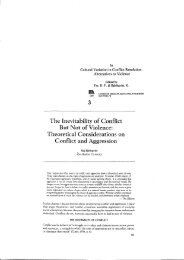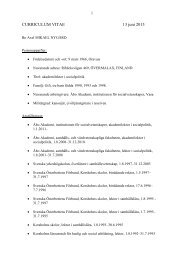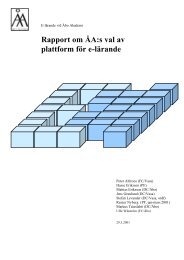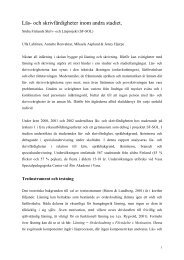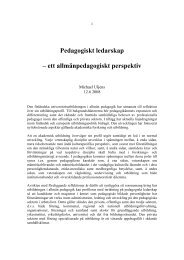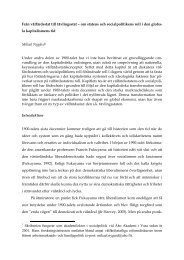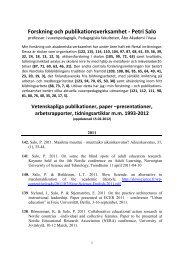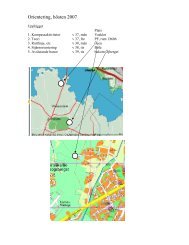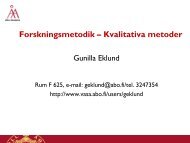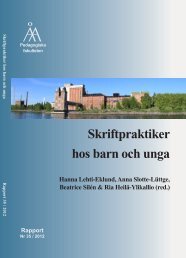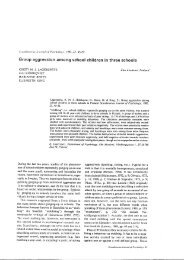Parties, Candidates and Citizens On-Line - Åbo Akademi
Parties, Candidates and Citizens On-Line - Åbo Akademi
Parties, Candidates and Citizens On-Line - Åbo Akademi
You also want an ePaper? Increase the reach of your titles
YUMPU automatically turns print PDFs into web optimized ePapers that Google loves.
(Coleman <strong>and</strong> Goetze, 2001: 16; Norris, 2001b). Likewise, in European countries, a<br />
similar divide is evident. Thus, Southern European countries have a significantly lower<br />
internet penetration rate than the Sc<strong>and</strong>inavian <strong>and</strong> other Northern European countries<br />
(Norris, 2000). Therefore, only the citizens in certain countries, including Finl<strong>and</strong>, have<br />
thus far had the necessary resources to facilitate political activity on-line.<br />
Nationally, a socioeconomic divide in the distribution of internet resources is also<br />
evident. Frequent internet users generally display similar demographic traits. Hence, the<br />
typical political internet user is a young, highly educated male with relatively high income<br />
(Gibson et al., 2002; Norris, 2001b). The extent of women’s internet usage is on a slight<br />
rise <strong>and</strong>, in the long run, the previously noted gender divide might erode (Gibson <strong>and</strong><br />
Ward 1999; Gibson et al. 2002). Nonetheless, according to Bimber (1999: 411-412), these<br />
demographic characteristics resemble those of citizens already engaged in off-line politics.<br />
All in all, then, the technological resources are unevenly distributed both between <strong>and</strong><br />
within nations. There exists a resource-based reinforcement (c.f. Str<strong>and</strong>berg, 2003: 21-24).<br />
There is a divide between those with access to on-line political information <strong>and</strong> those<br />
without this access.<br />
Secondly, assuming that the technological resources were evenly divided,<br />
proponents of the reinforcement scenario argue that on-line politics would still only<br />
attract those already politically interested (Gibson <strong>and</strong> Ward, 1999: 33; Hill <strong>and</strong> Hughes,<br />
1998: 185-186; Norris, 1999a: 9-10; 1999b; 2001b). Thus, this version of the<br />
reinforcement theory states that internet usage will neither improve nor diminish the<br />
existing political participation (e.g. Norris, 2001b: 98). Djupsund <strong>and</strong> Carlson mention<br />
that the internet differs from traditional mass media on one significant aspect: the internet<br />
requires that the user actively seeks the information he or she wants while, for example,<br />
television exposes the passive viewer to the political messages (Djupsund <strong>and</strong> Carlson,<br />
2003: 41). Likewise, Hill <strong>and</strong> Hughes (1998: 186) state the following concerning the<br />
internet: “People can tune into any ‘channel’ they desire, <strong>and</strong> choose their level of<br />
interactivity”. Norris (2001b: 219-228) mentions that, in such a situation, the citizens’<br />
previous knowledge, trust <strong>and</strong> interest for politics guide their choices between the<br />
numerous outlets on the internet. This version of the reinforcement theory could be<br />
called the motivation-based reinforcement theory (c.f. Str<strong>and</strong>berg, 2003: 25-25). Davis<br />
excellently summarizes the core of this argument:<br />
“However, the mere existence of communication technology does not<br />
transform people into political animals. Similarly, the internet does not cause<br />
people to suddenly become politically active or even interested. Rather<br />
political behavior will remain essentially the same regardless of technological<br />
innovations designed to disseminate more political information.” (Davis, 1999:<br />
8)<br />
149



